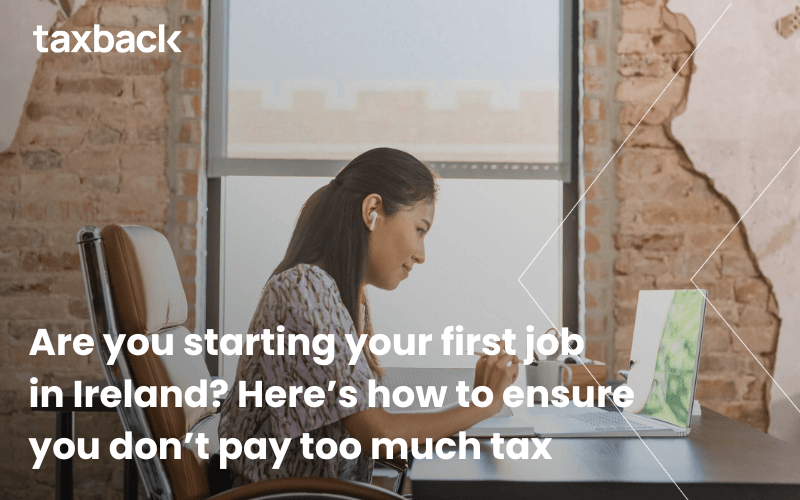We know that juggling study and work can be a bit of a struggle! Entering the real world of paying tax and being responsible for your own money can be daunting!
But don’t worry, Taxback is here to help you. Avoid wondering “Why am I getting taxed so much?”, in this article we look at the basics of the income tax system in Ireland and the important steps to take when starting your first job.
Tax basics
First things first. When you start your first job in Ireland as a PAYE (Pay As You Earn) employee, you’ll notice that tax is deducted from your salary each time you are paid by your employer.
Each time you’re paid, the payroll department can deduct Pay as You Earn (PAYE) income tax, Universal Social Charge (USC) and Pay Related Social Insurance (PRSI), depending on your circumstances.
Your employer then pays this tax to Revenue – the agency responsible for collecting taxes on behalf of the Irish government, making you potentially eligible for a tax refund down the road.
The Irish tax year runs from 1 January – 31 December. Many Irish taxpayers don’t realise they could be due tax back each year. It’s worth checking how much you could be due by applying for an income tax refund at the end of the tax year.
The average Irish tax refund is €1,880
PAYE
Also known as income tax. This is tax on the income that you earn from employment that is deducted from your wages and paid to Revenue.
The amount of income tax that you pay depends on the amount of income that you earn and your personal circumstances, such as marital status, age, tax credit and relief entitlements and others.
You will pay a standard rate of 20% on income up to the standard rate band (€40,000) and a higher rate of 40% on income above the standard rate band. In case you are wondering “Why am I paying so much PAYE tax?”, acknowledge that different rates will apply if you are married and jointly assessed.
In our blog Your No-Nonsense Guide to PAYE Taxes in Ireland you can find all the information about PAYE tax refunds in Ireland.
PRSI
PRSI is a contribution paid by most employees over the age of 16 up to the age of 66. If you earn over €38 a week you will have to pay this regardless of whether you work on a full or part-time basis.
The percentage of PRSI you pay will be dependent on the type of work you do and your pay. The standard PRSI rate is 4%. Your employer will also pay PRSI on your behalf.
The PRSI you pay is your contribution to the social insurance fund. This means that these contributions may give you an entitlement to claim monetary benefits such as Jobseeker’s Benefit, Illness Benefit, State Pension etc. in the future.
Contributing to PRSI is a significant aspect that could impact your eligibility for a potential tax refund. PRSI is the main source of funding for social benefits in Ireland.
The average Irish tax refund is €1,880
USC
USC is paid by any Irish worker earning over €13,000 gross income (income before deductions) per annum. If you earn less than €13,000 you will not pay USC.
There are reduced rates of USC for those who are:
- 70 years and over and earn less than €60,000 per annum
- under 70 years, hold a medical card and earn less than €60,000 per annum
Don’t pay too much tax! How to ensure you are taxed properly from the start
We want to help you prepare so that you don’t overpay tax. We want to ensure that your first glorious payslip isn’t less than what it should be. This will also help you maximize your tax refund.
Your employer will tax your income on an emergency basis if you do not take the necessary steps before starting your job!
This means you pay a higher rate of tax for a temporary period until you take steps to stop you from being emergency taxed.
The good news is, emergency tax is avoidable and if you follow our two steps below when starting your job, you can avoid it!

Before starting your job:
Step 1: Provide your employer with your PPSN
Firstly, you should give your employer your Personal Public Service Number (PPS). This is the unique reference number issued to you by the Department of Social and Family Affairs. This enables you to work, pay taxes and access public services in Ireland.
Once your employer receives your PPSN, they will inform Revenue when you start work. This creates a new employment record for you and lets your employer gain access to valid tax credits and bands for you.
Step 2: Register with Revenue
Next, you should register the details of your new job with Revenue. Your employer will then receive an RPN (Revenue Payroll Notification).
It is important that you take the two steps listed above as soon as you can and ideally as soon as you have signed your employment contract.
This allows your employer more time to ensure you are set up properly for tax before your first payslip comes in.
One major benefit of taking these steps early is that you avoid paying the dreaded emergency tax.
However, don’t worry if you have been emergency taxed in the past four years. We can help you to submit your tax return and claim your tax refund in Ireland.
The average Irish tax refund is €1,880
How to claim your tax refund
It is likely that at the end of the tax year (31 December), you will be entitled to a tax refund!
There are hundreds of reasons you may be due tax back – from paying doctors bills and college fees, to simply overpaying on your tax bill (including emergency tax).
Why leave your refund with the taxman? Taxback takes the hassle out of tax refunds!
We handle all the paperwork for you and transfer your money straight to your bank account.
The average Irish tax refund is €1,880
Why choose Taxback?
- No refund, no fee!
- We have filed over a million tax returns in Ireland
- We transfer your refund straight into your bank account!
- Live chat team available 24/7.
- The average customer refund is €1,880.
Last Updated on March 14, 2024







